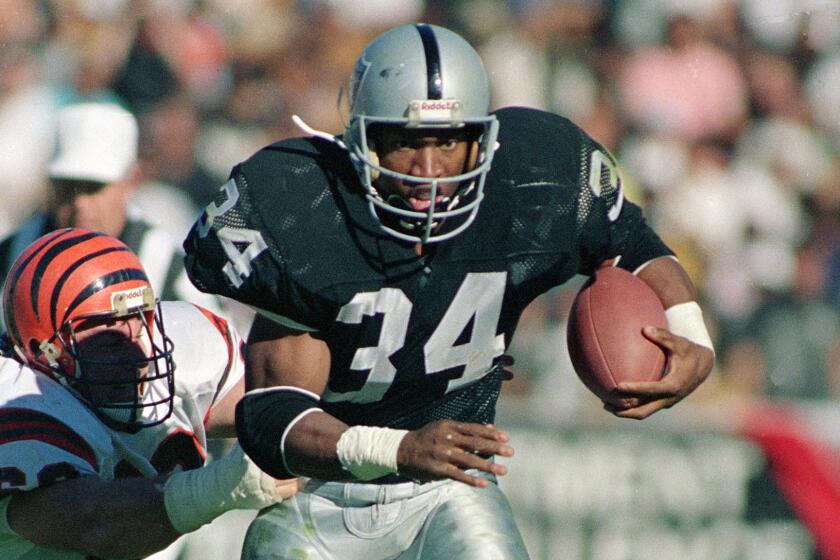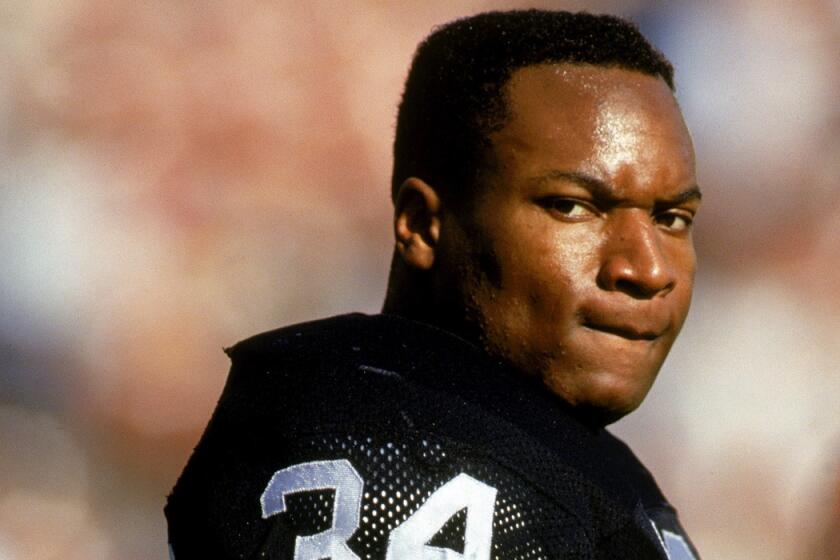
- Share via
At age 62, Bo knows forgiveness. Or at least compromise.
Legendary dual-sport phenom Bo Jackson has abandoned a $21-million judgment awarded to him last year in an extortion and harassment case involving his niece and nephew.
Jackson, whose prodigious feats as a Los Angeles Raiders running back and a Major League outfielder in the late 1980s and early ‘90s put him in the conversation as the best athlete, alleged that Thomas Lee Anderson and Erica M. Anderson harassed and tried to extort $20 million from him. A Cobb County, Ga., Superior Court judge in February ruled in Jackson’s favor and awarded him $20 million in punitive damages and $1 million in compensatory damages.
In addition to the financial award, Judge Jason Marbutt granted Jackson a permanent protective order against the Andersons, who are siblings.
“Defendants have acted with malice, wantonness, oppression, with a conscious effort of indifference to circumstances and with the specific intent to cause Plaintiff harm,” Marbutt wrote in his ruling.
Jeff Pearlman’s book chronicling Bo Jackson’s life includes the star’s introduction to the L.A. Raiders, during which his elite talent was instantly clear.
Nearly a year later, however, Marbutt granted Jackson’s motion to vacate the default judgment and permanent injunction as well as the stalking permanent protective order against the Andersons.
“The parties have conducted two mediations and have reached a private agreement resolving this dispute,” the court filing said.
According to the lawsuit filed by Jackson in 2023, the Andersons attempted to extort $20 million from him in exchange for not publicly disclosing information that would cast him “in a false light” and cause “severe emotional distress.”
Jackson won the Heisman Trophy in 1985 as a running back at Auburn, played for the Raiders from 1987-90 and for the Kansas City Royals, Angels and Chicago White Sox from 1986-94. He has operated several businesses since retiring, and might be best known for pitching shoes for Nike.
The sneaker giant’s first commercial employing Jackson was aired during the 1989 MLB All-Star Game, titled “Cross-Training by Bo Jackson.” A shot of Jackson crushing a fastball is followed by Dodgers star Kirk Gibson telling the camera, “Bo knows baseball.” Next Rams quarterback Jim Everett says, “Bo knows football,” then Chicago Bulls phenom Michael Jordan says, “Bo knows basketball, too.”
With Bo Diddley wailing on electric guitar in the background, John McEnroe asks, “Bo knows tennis?” followed by U.S. Olympic marathon champion Joan Benoit saying, “Bo knows running!” and Kings star Wayne Gretzky just saying “No,” while standing on ice.
Bo knows. That was the slogan that helped make Bo Jackson a household name in the 1980s.
The commercial ends with Jackson doing his own wailing on guitar, only to have the real guitar legend tell him jokingly, “Bo, you don’t know Diddley.”
Jackson apparently knew enough about the Andersons’ inability to pay him millions to agree to new terms that state the siblings owe him no money but are not to come within 500 yards of him. They may not threaten, harass or intimidate Jackson or his wife or children and may not have direct contact with them at family events.
The Andersons alleged that their lawyer did not inform them of the court appearance where Marbutt ordered them to pay $20 million. Marbutt found for Jackson in a default judgment after the Andersons failed to appear in court.
Jackson’s lawyers issued this statement after that hearing: “Unfortunately for those attempting to extort $20 million from Jackson and his family, Bo still hits back hard.”
The Andersons retained new lawyers, who responded with a court filing that stated, “Jackson seeks to use his power, fame, and financial resources to intimidate and ultimately silence his niece and nephew. The Andersons should not be made destitute because their lawyer lied to them.”
Ahead of the Rose Bowl, Bryce Boettcher has proved to be a tackling machine for Oregon on the gridiron and a standout on the baseball diamond.
Jackson was the first overall pick in the 1986 by the Tampa Bay Buccaneers, but did not sign, instead opting for the Royals, who made him a fourth-round pick in the MLB draft two months later and sent him to the major league team.
A year later, Raiders owner Al Davis took a chance and drafted Jackson in the seventh round, even though he’d made it clear baseball was his first priority. It took a few months, but Jackson agreed to a long-term, $1-million a year deal with the Raiders, making Davis’ gamble a winning wager.
In four seasons, Jackson split time at running back with fellow Heisman winner Marcus Allen, rushing for 2,782 yards and 16 touchdowns while averaging a robust 5.4 yards a carry. Three times he had the longest run from scrimmage in the NFL, with two of them exceeding 90 yards. In the 1990 season, Jackson made the Pro Bowl.
Meanwhile, Jackson was tearing up the American League, hitting 107 home runs during a four-year span from 1987-90. In 1989, he was MVP of the All-Star Game and hit 32 home runs while driving in 107.
Hip replacement surgery in 1992 ended his NFL career, but he returned to MLB in 1993 after a two-year layoff, hitting 16 home runs in 85 games for the White Sox. He finished his MLB career with the Angels, in 1994, batting .279 with 13 homers in 75 games.
More to Read
Go beyond the scoreboard
Get the latest on L.A.'s teams in the daily Sports Report newsletter.
You may occasionally receive promotional content from the Los Angeles Times.














